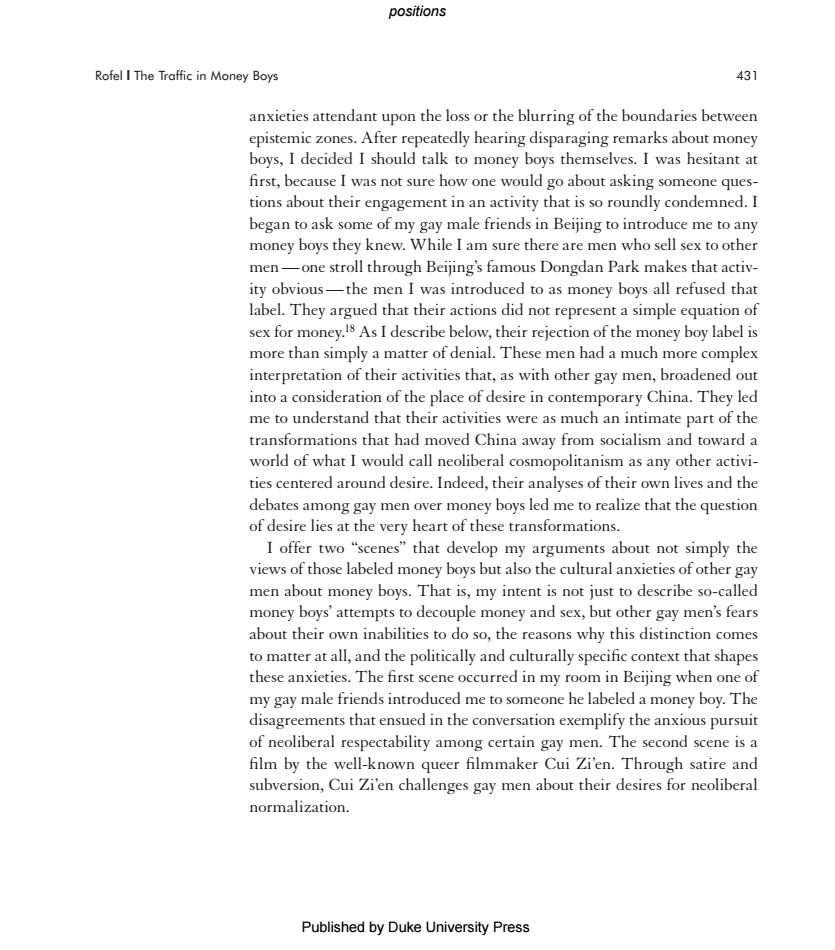正在加载图片...

positions Rofel I The Traffic in Money Boys 431 anxieties attendant upon the loss or the blurring of the boundaries between epistemic zones.After repeatedly hearing disparaging remarks about money boys,I decided I should talk to money boys themselves.I was hesitant at first,because I was not sure how one would go about asking someone ques- tions about their engagement in an activity that is so roundly condemned.I began to ask some of my gay male friends in Beijing to introduce me to any money boys they knew.While I am sure there are men who sell sex to other men-one stroll through Beijing's famous Dongdan Park makes that activ- ity obvious-the men I was introduced to as money boys all refused that label.They argued that their actions did not represent a simple equation of sex for money.1s As I describe below,their rejection of the money boy label is more than simply a matter of denial.These men had a much more complex interpretation of their activities that,as with other gay men,broadened out into a consideration of the place of desire in contemporary China.They led me to understand that their activities were as much an intimate part of the transformations that had moved China away from socialism and toward a world of what I would call neoliberal cosmopolitanism as any other activi- ties centered around desire.Indeed,their analyses of their own lives and the debates among gay men over money boys led me to realize that the question of desire lies at the very heart of these transformations. I offer two "scenes"that develop my arguments about not simply the views of those labeled money boys but also the cultural anxieties of other gay men about money boys.That is,my intent is not just to describe so-called money boys'attempts to decouple money and sex,but other gay men's fears about their own inabilities to do so,the reasons why this distinction comes to matter at all,and the politically and culturally specific context that shapes these anxieties.The first scene occurred in my room in Beijing when one of my gay male friends introduced me to someone he labeled a money boy.The disagreements that ensued in the conversation exemplify the anxious pursuit of neoliberal respectability among certain gay men.The second scene is a film by the well-known queer filmmaker Cui Zi'en.Through satire and subversion,Cui Zi'en challenges gay men about their desires for neoliberal normalization. Published by Duke University PressRofel ❘ The Traffic in Money Boys 431 anxieties attendant upon the loss or the blurring of the boundaries between epistemic zones. After repeatedly hearing disparaging remarks about money boys, I decided I should talk to money boys themselves. I was hesitant at first, because I was not sure how one would go about asking someone questions about their engagement in an activity that is so roundly condemned. I began to ask some of my gay male friends in Beijing to introduce me to any money boys they knew. While I am sure there are men who sell sex to other men— one stroll through Beijing’s famous Dongdan Park makes that activity obvious— the men I was introduced to as money boys all refused that label. They argued that their actions did not represent a simple equation of sex for money.18 As I describe below, their rejection of the money boy label is more than simply a matter of denial. These men had a much more complex interpretation of their activities that, as with other gay men, broadened out into a consideration of the place of desire in contemporary China. They led me to understand that their activities were as much an intimate part of the transformations that had moved China away from socialism and toward a world of what I would call neoliberal cosmopolitanism as any other activities centered around desire. Indeed, their analyses of their own lives and the debates among gay men over money boys led me to realize that the question of desire lies at the very heart of these transformations. I offer two “scenes” that develop my arguments about not simply the views of those labeled money boys but also the cultural anxieties of other gay men about money boys. That is, my intent is not just to describe so-called money boys’ attempts to decouple money and sex, but other gay men’s fears about their own inabilities to do so, the reasons why this distinction comes to matter at all, and the politically and culturally specific context that shapes these anxieties. The first scene occurred in my room in Beijing when one of my gay male friends introduced me to someone he labeled a money boy. The disagreements that ensued in the conversation exemplify the anxious pursuit of neoliberal respectability among certain gay men. The second scene is a film by the well-known queer filmmaker Cui Zi’en. Through satire and subversion, Cui Zi’en challenges gay men about their desires for neoliberal normalization. positions Published by Duke University Press